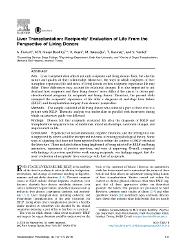Liver Transplantation: Recipients’ Evaluation of Life From the Perspective of Living Donors
Access
info:eu-repo/semantics/openAccessDate
2016Author
Tankurt, AslıKrespi-Boothby, Margörit Rita
Acarlı, Koray
Kalayoğlu, Mü nci
Kanmaz, Turan
Yankol, Yucel
Metadata
Show full item recordAbstract
Aim. Liver transplantation affects not only recipients and living donors' lives but also the nature and quality of their relationship. Moreover the ways in which recipients of liver transplant experience life and views of living donors on how recipients experience life may differ. These differences may account for relational changes. It is also important to understand how recipients and their living donors' views differ if the aim is to devise psychoeducational programs for recipients and living donors. Therefore the present study examined the recipients' experience of life after a diagnosis of end-stage liver failure (ESLF) and transplantation surgery from donors' perspective. Methods. The sample consisted of 16 living donors who donated a part of their liver to a patient with ESLF. Thematic analysis was undertaken in parallel with interviews during which an interview guide was followed. Findings. Donors felt that recipients evaluated life after the diagnosis of ESLF and transplantation surgery in terms of limitations mixed relationships emotional changes and improvement in life. Conclusion. Experience of social limitations negative emotions and the feeling that one is supported by others could be interpreted in terms of existing psychological theory. Some ways of adjusting that have not been reported before within the context of ESLF extended the literature. These included others being frightened of being infected by ESLF and being insensitive experience of positive emotions and ways of improving. Overall compared with findings of previous qualitative work among recipients our findings suggest that donors' evaluation of recipients' lives converge with that of recipients.
















